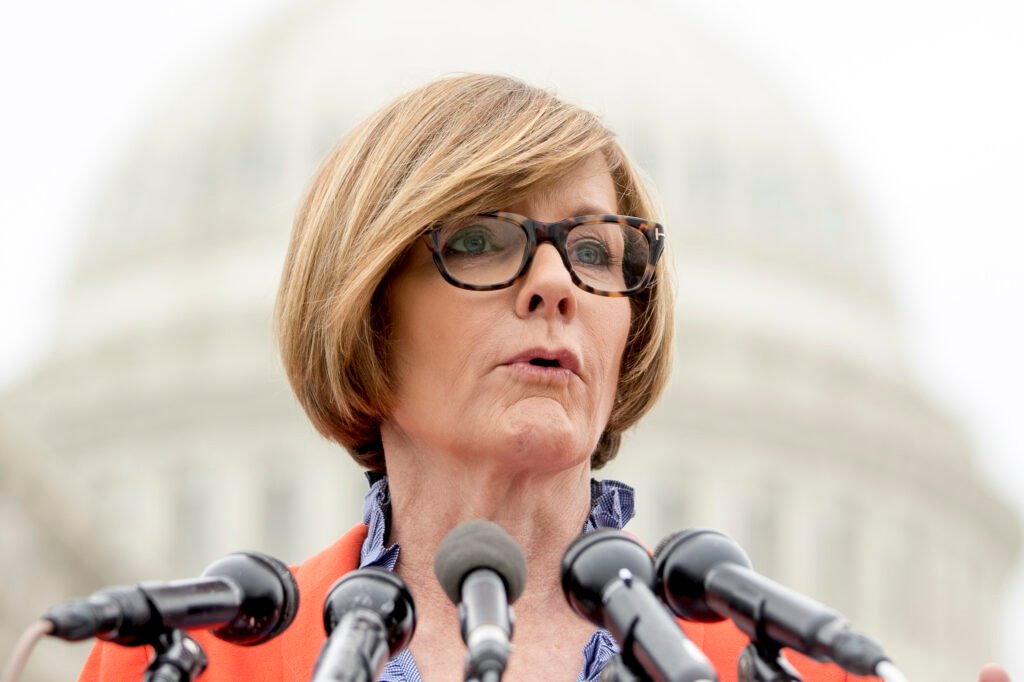
Behind closed doors on Wednesday, a Nevada Democrat implored her House colleagues to “stop pissing on each other and start pissing on” Republicans over the shutdown deal, according to two people familiar with her remarks.
They weren’t all listening.
While battleground lawmaker Susie Lee was making her case for a united Democratic front, clips of Rep. Alexandria Ocasio-Cortez (D-N.Y.) bashing Senate Democrats who supported ending the federal government shutdown were racking up hundreds of thousands of views online.
The decision by eight Senate Democrats to give Republicans the necessary votes to reopen the federal government this week, without definitive concessions on health care costs, has inflamed divisions within a party that for years has been reeling from internal feuds. Now, Democratic strategists are warning the latest fight is distracting from the party’s mission of pummeling the GOP ahead of the pivotal midterms next year.
Nearly every Democrat running for the Senate condemned the deal and more than a half-dozen House Democrats called for the party to dump Minority Leader Chuck Schumer. House frontliners and prominent progressives piled on. Democrats popped off on cable news interviews, in direct-to-camera videos on social media and on podcasts, venting about how their party caved. They even started fundraising off the intraparty feud.
But all that fury is threatening to rebound on them, some Democrats said.
“We didn’t love the deal either, but that doesn’t mean we think Democrats should be out shooting at each other over this,” said Matt Bennett, president of Third Way, a centrist think tank. “We need to keep the focus on where this belongs: Trump and Republicans having taken away health care from millions. Internecine warfare among Democrats is bonkers and should stop.”
Or, as another Democratic strategist, granted anonymity to discuss the issue candidly, put it: “The circular firing squad is not helpful.”
The House Democratic campaign arm weighed in, too, begging its members “to hold vulnerable Republicans … accountable” for the government shutdown in a memo circulated on Monday.
The internal dispute over how and when to end the longest government shutdown lays bare the deep divisions coursing through the party’s primaries across the country. Some Democrats, usually the younger ones, want to aggressively fight President Donald Trump’s agenda, reflecting the intense pressure from an enraged base. Yet other, more establishment-minded Democrats, don’t think “standing up to Donald Trump” worked, as Sen. Angus King (I-Maine) said during an MSNBC interview Monday.
But there’s a risk, some Democratic strategists warned, in “los[ing] focus on the central health care issue and who’s to blame, which is the Republicans,” said Mark Longabaugh, a veteran consultant who was a top strategist for Bernie Sanders’ 2016 presidential campaign. “From a political standpoint, Democrats have to return their focus [to Republicans] no matter how angry they may be with a betrayal of eight senators.”
The pressure for party unity is high, as deadlines loom for the next round of political battles: In December, Democrats are seeking a vote to extend the expiring Affordable Care Act subsidies that faces an uncertain path through the GOP-controlled Congress. In January, they’ll confront another government funding deadline.
It all comes at a perilous moment for Democrats, who are suffering from historically poor approval numbers that haven’t recovered much from their electoral wipeout last year. Democrats were jubilant about last week’s off-year victories across the country, positing that their candidates’ overperformance in two gubernatorial races indicates deep dissatisfaction with Republicans that will carry into the midterms. Public polling, too, consistently showed Republicans shouldering more of the blame for the shutdown than Democrats.
“Yet, now, here we are again, with Democrats in disarray,” said Jim Manley, a longtime Senate aide to then-Majority Leader Harry Reid.
Republicans are reveling in Democrats’ latest civil war, while warning it could end quickly and refocus the spotlight onto the GOP over one of its weaker electoral issues. Democrats held the advantage in a recent KFF poll that asked which party voters trust to handle the high cost of health insurance. Only one-third of voters in an AP-NORC poll released this week approve of Trump’s handling of health care.
“Their very messy family fight may complicate primaries and the future of the party, but it does not provide cover for the GOP on health care,” GOP strategist Matthew Bartlett said.
Democrats whiffed their first shot at unifying on Monday, but the ongoing furor over their party’s defectors — and Schumer’s inability to control them — threatened to overpower Democrats’ attacks on the GOP after Republicans blocked Sen. Tammy Baldwin’s (D-Wis.) effort to force a vote on a one-year extension of the Obamacare subsidies. They’ll have another opportunity as House Democrats launch their own effort to force a vote on an extension through a procedural maneuver that would require some Republican support to reach the floor.
“People are focused on the deal right now and there wasn’t a lot of advance hubbub around the Baldwin test vote,” Democratic strategist Jared Leopold said. “By the time there is a vote in December, presumably there will be some more attention around that.”
Democrats are pivoting, but not in lockstep.
Former Sen. Sherrod Brown bashed his GOP rival, Sen. Jon Husted, on Monday for “making health care unaffordable for small business owners” in a post that lacked any mention of the Democratic divide. Maine Gov. Janet Mills has hammered Republican Sen. Susan Collins, whose seat she’s seeking, for voting against Baldwin’s effort while continuing to criticize the Democratic senators who cut the shutdown deal. In Iowa’s open Senate race, state Sen. Zach Wahls kicked off a Monday press call by pairing a call for Schumer to step aside with an attack on Republicans’ “refusal to extend health care funding.”
The intraparty pile-on speaks to the political forces shaping the competitive primaries Democrats are facing in critical Senate and House races. At a time when the base is clamoring for more fighters, no one wants to be caught on the wrong side of the ropes.
“This is a downstream effect of primaries because it incentivizes talking about people who generally share your values but you differ on tactics or strategy, and explaining why they’re wrong. I don’t think that makes us more at risk,” said Amanda Litman, co-founder of the progressive candidate training group Run For Something. “I think working through it, then voters making a decision, makes us stronger in the end.”
But there appear to be limits to Democrats’ self-destruction.
Inside the Capitol, Schumer is not facing a serious threat to his leadership post at the moment, though confidence in his stewardship has taken another hit within the caucus, according to a Senate Democratic aide granted anonymity to describe internal conversations. Even Sanders, who has endorsed several of the Senate candidates most outspoken against the caucus, admitted this week that Democrats do not have a replacement.
“I understand the frustration of the base and members, but we can’t spend all our time attacking each other,” Manley said. “I’m hoping Democrats can return to the health care debate and put Republicans on their back foot.”
